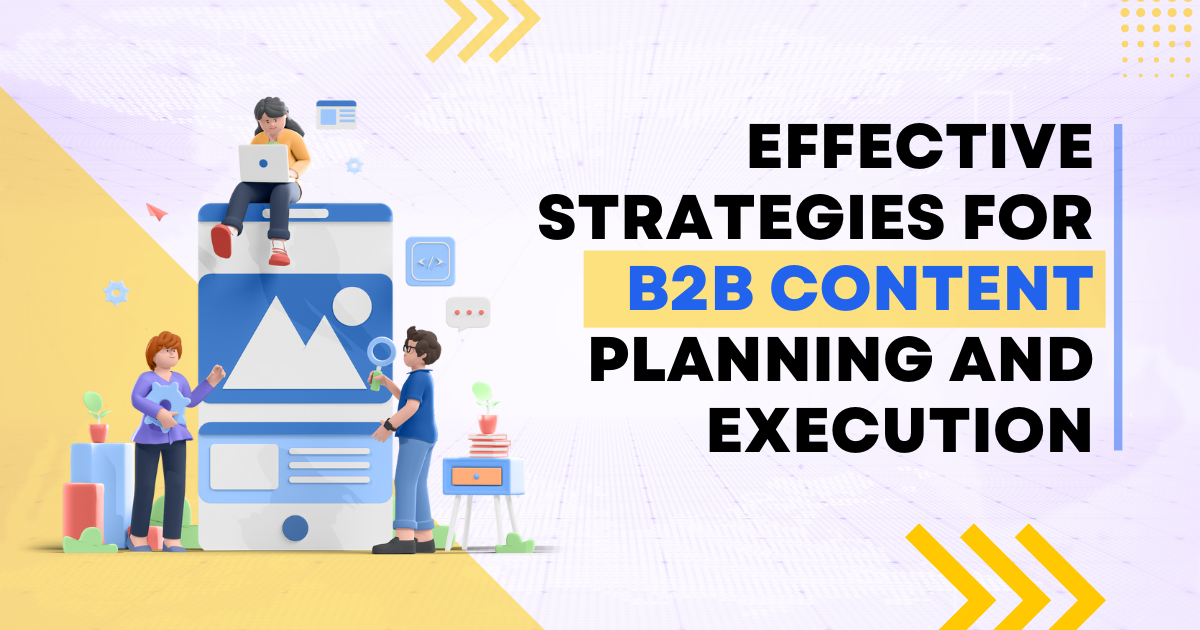In the competitive landscape of B2B marketing, effective content planning and execution are crucial for capturing the attention and interest of your target audience. A well-thought-out content strategy can help you build brand authority, generate leads, and drive conversions. In this blog, we will explore a range of strategies to help you plan and execute B2B content that resonates with your audience and achieves your business goals.
Understanding Your Target Audience

It is crucial to understand your target audience before creating content. Conduct thorough market research and customer analysis to gain insights into their needs, pain points, and preferences. Create detailed buyer personas to represent different segments of your audience. By understanding your target audience, you can create content that addresses their challenges and provides value.
Establishing Clear Goals and Objectives
To make your content efforts focused and measurable, establish clear goals and objectives. Use the SMART framework (Specific, Measurable, Achievable, Relevant, Time-bound) to define your goals. Align these goals with your overall business objectives, whether it's increasing brand awareness, generating leads, or nurturing existing customers. Determine key performance indicators (KPIs) to track the success of your content initiatives.
Furthermore, developing a solid content strategy is essential for effective planning and execution. Define your B2B content strategy by considering the goals, target audience, and available resources. Identify the types and formats of content that resonate with your audience, such as blog posts, whitepapers, case studies, or videos. Create a content calendar to ensure a consistent and regular publishing schedule. Maintain a cohesive brand voice and messaging across all content channels.

Conducting Keyword Research
Keyword research plays a vital role in optimizing your B2B content for search engines and improving discoverability. Utilize keyword research tools to identify relevant keywords and topics in your industry. Focus on high-value keywords with moderate competition. Incorporate these keywords strategically into your content planning and optimization to enhance your visibility in search engine results.
Moreover, to capture your audience's attention, create compelling and relevant content. Craft engaging headlines and introductions that pique curiosity and entice readers to continue reading. Incorporate storytelling techniques to humanize your content and make it relatable. Provide valuable and actionable information that solves your audience's challenges. Incorporate visual elements, such as images, infographics, and videos, to enhance engagement and understanding.
Leveraging Different Content Distribution Channels
Identify the most effective content distribution channels for your B2B audience. Improve organic visibility by optimizing your content for search engines (SEO). Utilize social media platforms strategically to reach and engage your target audience. Leverage email marketing and newsletters to nurture leads and maintain communication with existing customers. Each channel requires unique strategies and tailored content formats.
Further, to determine the effectiveness of your content, it's crucial to track and analyze key metrics and KPIs. Utilize analytics tools to gain data-driven insights into your content performance. Monitor metrics such as website traffic, engagement rates, conversion rates, and time on page. Assess the performance of your content against your established goals and make data-informed decisions to optimize future content initiatives.

Optimizing B2B Content Marketing Strategy
B2B content planning and execution are iterative processes. Continuously review and improve your content strategy based on performance data and feedback. Conduct A/B testing and experiment with different approaches to identify what resonates best with your audience. Solicit feedback from your target audience and customers to gain valuable insights for further optimization. Stay updated with industry trends and best practices to ensure your content strategy remains relevant and effective.
Furthermore, engaging subject matter experts within your organization or industry can elevate the quality and credibility of your B2B content. Conduct interviews with industry thought leaders and influencers to gather unique insights and expert opinions. Incorporate these perspectives into your content to provide added value and establish your brand as a trusted authority in the industry.
Here is a free template of an I.G. calendar

Conclusion
Effective B2B content planning and execution require a strategic approach that revolves around understanding your audience, setting clear goals, creating compelling content, and leveraging the right distribution channels. By implementing the strategies discussed in this blog, you can enhance your B2B content marketing efforts and achieve your desired outcomes. Remember to stay adaptable and continuously iterate your content strategy to stay ahead of the competition and meet the evolving needs of your target audience.
Here is another blog you may find interesting: Understanding HubSpot Marketing Analytics Reports: A Deep Dive

